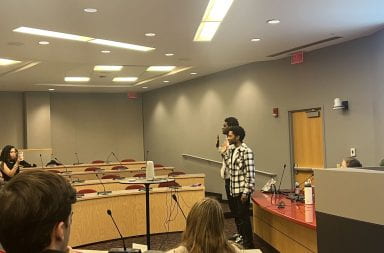A free Palestine is the focus of those attending The Third Nation Student Conference of the Palestine Solidarity Movement being held at Ohio State.
The Third Nation Student Conference of the Palestine Solidarity Movement began with a rally in Solidarity at the corner of 15 Avenue and High Street. Individuals came to the microphone and shared their beliefs toward their support of freedom in Palestine and spoke out against the Israeli presence in Palestine.
However, those attending the rally were not all in support of the Palestine Solidarity Movements purposes. Protestors chanted and sang out against the conference and voiced their opinions in opposition to the rally supporters.
The Palestine Solidarity Movement is a national coalition of pro-Palestine human rights that agrees on five points of unity which are to be addressed at the conference. The five points being, the end the Israeli occupation in Palestine, the right of return for Palestinian refugees, equality under law, the divestment of solidarity with the Palestinian people and the opposition of racism and all forms of oppression.
“We are activist engaged in a world struggle, and we as people must stand together to achieve equality and freedom in Palestine,” said Fatima Ayub, an M.A. student at the School of Advanced International Studies at Johns Hopkins University.
The evening session stated with the Edward W. Said Memorial Lecture; Towards a Global Intifada: Building Palestinian Solidarity with Other Liberation Struggles. The lecture was a panel discussion featuring four speakers which shared their views and antidotes on the state of Palestine and what needed to be done about the oppression that the Palestinian people faced.
“We need to highlight our ethnical choices as an activist movement to advocate for freedom and justice,” Ayub said. “We are still only human and must join together and understand each others rights as humans because we all want to and need to show support against oppression.”
Panel member Ashanti Alston, the Northeast U.S. Coordinator for Critical Resistance, noted the need to find a way to join together and find peace and that it needed to start within the United States. “I know many Palestinians and it breaks my heart to see all the hate toward them in both America and in Palestine.”
“Over the past three years we have grown as a nationwide organization with much support and now we must focus on our strategy, our divestment campaign,” said panelist Noura Erakat, a second year Boalt Hall Law student at U.C. Berkeley.
Barry Landeros-Thomas, a graduate student in psychology at Ohio State stressed how important it was for the group to remain strong with their beliefs and aspirations toward the oppressed people. “We are still here and will be here to support all indigenous people against their oppressors until they are no longer threatened.”


